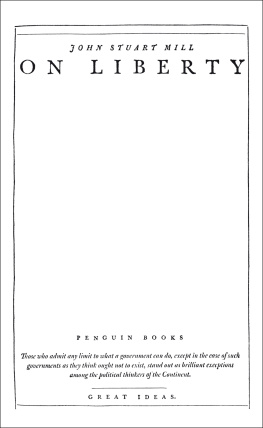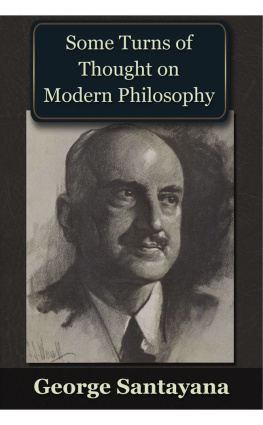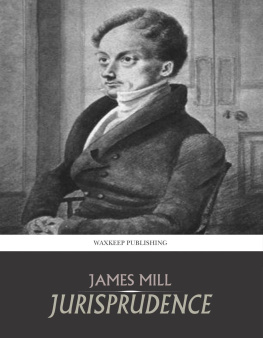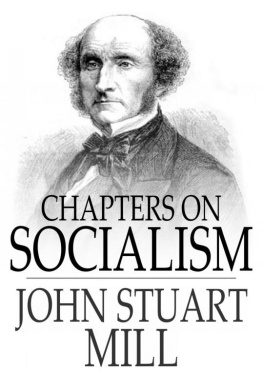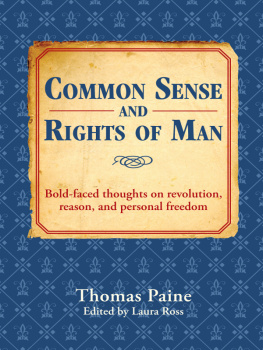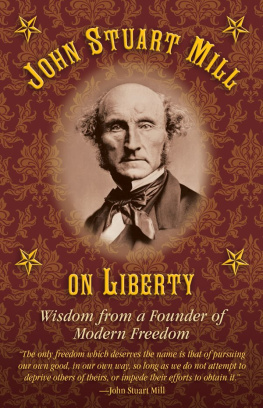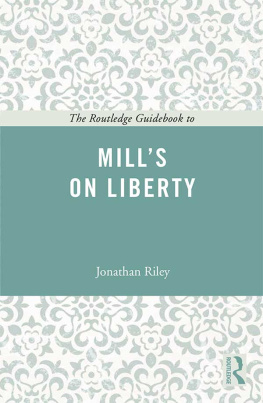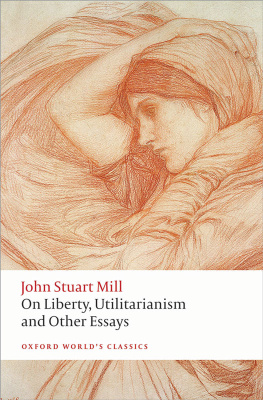ON LIBERTY
Bold-faced thoughts on free
will, free speech, and the
importance of individuality
John Stuart Mill
Edited by Laura Ross


STERLING and the distinctive Sterling logo are registered trademarks of
Sterling Publishing Co., Inc.
2012 by Sterling Publishing Co., Inc.
All rights reserved. No part of this publication may be reproduced, stored in a retrieval system, or transmitted, in any form or by any means, electronic, mechanical, photocopying, recording, or otherwise, without prior written permission from the publisher.
ISBN 978-1-4027-9880-1
For information about custom editions, special sales, and premium and corporate purchases, please contact Sterling Special Sales at 800-805-5489 or specialsales@sterlingpublishing.com.
2 4 6 8 10 9 7 5 3 1
www.sterlingpublishing.com
INTRODUCTION
TO THIS EDITION
BY LAURA ROSS

T he struggle between liberty and authority may never be resolved, but we couldnt ask for a more passionate guide through its intricacies than John Stuart Mill (180673).
The British economist, philosopher, and ethical theorist is considered by many to have been the most influential Englishspeaking Tthinker of the nineteenth century. Among his writings, no work has proved more enduring than On Liberty.
The eldest son of James Mill, a Scottish philosopher, historian, and economist, Mill was rigorously home-schooled by his father and deliberately kept out of the company of children his own age. A follower of the philosopher Jeremy Bentham (godfather of Utilitarianism), James hoped in this way to create a genius who would carry on and expand upon Benthams ideasand his own. Whether or not James methods were wholly responsible, the young Mill blossomed intellectually under his fathers tutelage, excelling in the classical languages, mathematics, history, and literature.
At age 14, Mill spent a year in France, where he lived with the family of Jeremy Benthams brother and studied chemistry, zoology, and logic. Though Mill became an accomplished polymath, his isolated childhood of intensive study ultimately took an emotional toll on the boy: at age 20, he suffered a breakdown and period of intense depression that he later blamed on his single-minded focus on his studies at the expense of normal childhood experiences.
Though Oxford and Cambridge beckoned, Mill decided against college and took a job as a clerk at the East India Company, where his father was employed, in 1823. As he rose through the ranks, he simultaneously embarked on the life of a writer. He also formed an intimate (though platonic) and extremely influential long-term friendship with Harriet Taylor, the wife of a druggist. He would eventually marry her in 1851, two years after her husbands death.
In his 1901 introduction to On Liberty, included in its entirety in this edition, W. L. Courtney writes at length about Taylors influence on Mills ideasparticularly those that form the basis of this work. (Mill was inconsolable upon his wifes death in 1858 and spent six months of every subsequent year in Avignon, where she died, just to be near her grave.) In his autobiography, published posthumously by his own intention, Mill reiterated Taylors pivotal role in his intellectual and emotional development, implying that it was she, not his father, who honed his philosophy and opened him to the possibilities of the individual in a society that encourages freedom of thought and expression.
In 1865, Mill was elected to the House of Commons, but almost immediately found himself at odds with his colleagues. His unwillingness (or inability) to compromise his beliefs made him a less-than-ideal politician, and he failed in his reelection bid. But Mill continued to write about and promote radical causesincluding that of equal rights for womenfor the rest of his life.
Mill began to build his philosophical reputation in 1843 with his System of Logic, following it with Principles of Political Economy in 1848 and other works. But his two best known and lasting works of moral philosophy remain On Liberty (1859) and Utilitarianism (1861). Still read with great interest as well is his forward-thinking essay, The Subjection of Women (1869), and two posthumous publications shepherded into print by his late wifes daughter, Helen Taylor: Autobiography (1873) and Three Essays on Religion (1874).
Published in 1859 to considerable controversy, On Liberty was sparked by Mills mounting concern (shared in conversation and correspondence with his wife) over the effects of mass democracy on middle-class life in Englandparticularly, the decline of bold, original thinkers; the rise of conformity; and the dampening of spontaneity, individuality, and, ultimately, personal freedom. The fire of his belief was fueled by his reading of Alexis de Tocquevilles Democracy in America, which described a prosperous middle-class society that seemed to care nothing for the liberties of the freethinking individual. If this young nation (a mere sixty years old when de Tocqueville described it) was already so stolid and paternalistic, what hope did England have against the rising tide of convention and conformity?
Mills eloquent defense of individuality lights up every page of On Liberty and offers us much to think about in a contemporary context. As he defends his most basic tenetthat each of us has the absolute right to believe in and do what we like, as long as we dont harm others in the processhe convincingly lays out the benefits to society as a whole of each individuals contributions. It is a position as worthy of examination today as it was when he first set it down, both for its substance and its rhetorical method. It might even inspire you to think of the ways that youone personcan influence the world with your ideas and actions.
This is a unique edition of On Liberty, designed to help you approach Mills principles from your own perspective. As you immerse yourself in his thoughts, pay particular attention to the passages and ideas that have been highlighted, and think about how they resonate and apply to the world you live in now (your country, community, school, workplaceeven your family). And when you reach the end of each chapter, take some time to absorb the commentary and answer the questions posed. (Feel free to write on the pages provided, or record your ideas in any way that suits you.) These For Further Thought sections are included to help you connect with Mills ideas and crystallize your own thoughts about all that Mill provocatively poses in his succinct, powerful book.
INTRODUCTION
BY W. L. COURTNEY

I
J ohn Stuart Mill was born on 20th May 1806. He was a delicate child, and the extraordinary education designed by his father was not calculated to develop and improve his physical powers. I never was a boy, he says; never played cricket. His exercise was taken in the form of walks with his father, during which the elder Mill lectured his son and examined him on his work. It is idle to speculate on the possible results of a different treatment. Mill remained delicate throughout his life, but was endowed with that intense mental energy which is so often combined with physical weakness. His youth was sacrificed to an idea; he was designed by his father to carry on his work; the individuality of the boy was unimportant. A visit to the south of France at the age of fourteen, in company with the family of General Sir Samuel Bentham, was not without its influence. It was a glimpse of another atmosphere, though the studious habits of his home life were maintained. Moreover, he derived from it his interest in foreign politics, which remained one of his characteristics to the end of his life. In 1823 he was appointed junior clerk in the Examiners Office at the India House.
Next page

